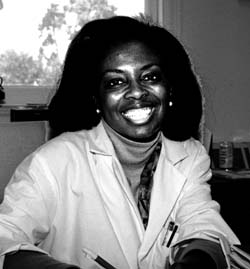Erasing Reminders of a Violent Past:
A profile of Dr. Lisa Benton
Late one Friday afternoon deep in the recesses of a vacant wing of Oakland's Highland Hospital, trauma surgeon Lisa Benton and public health worker Janice Louie examine slides of biceps, forearms and hands scarred by fading tattoos that Benton has begun to remove through a series of laser treatments.
The tattoos belong to local youth who have come to Highland and Dr. Benton in order to remove from their skin the graphic reminders of a life they are trying to escape. A life centered around a gang that may include crime, drugs and violence.
Benton plans to use these images to convince the Alameda County Board of Supervisors to provide money for Project New Start, the highly-demanded and chronically underfunded tattoo-removal program at Highland. The project, started in 1994, is threatened with elimination because of funding shortfalls.
"My office is in a trailer and my position has been uncertain for two years," said Louie, who is the program's coordinator and only staff person. "We have about 300 people who want to get into this program and we just don't have enough money."
While working with Louie to remove tattoos and lobbying the Board of Supervisors for funds are big challenges, they are just two of the seemingly endless daily efforts Benton makes to try to prevent violence.
Benton, 31, is one of five surgeons in the state to receive a two-year Academic Fellowship from the California Wellness Foundation to advocate for and personally engage in violence prevention at the hospital and in the community.
As a trauma surgeon at Highland, Benton knows that there is no shortage of violence to prevent. She says Alameda County has one of the highest assault injury (including gunshots, beatings and stabbings) rates and the third highest rate of violent injuries and deaths in the state. According to Benton, about 85 percent of the violent injury surgeries performed for patients without insurance in Alameda County are done at Highland.
"People get sent away from Kaiser and other local hospitals and they come here. I remember a guy who got shot in a park around the corner from Kaiser and they told him he would have to go to Highland," said Benton.
When Benton is not operating on someone, she is involved in multiple violence prevention projects. They include: studying the effects of violence-related trauma during pregnancy; promoting and evaluating a teen, peer, violence prevention counseling program; and surveying violence prevention in-residency efforts.
These projects are in addition to Benton's work with the tattoo removal program and her daily rounds with UC Davis medical students and residents who serve as the Highland "trauma team," and treat emergency cases.
Adding to her daunting list of tasks, Benton is on 24 hour call for emergency surgery two or three times a month and participates in a mentoring program at the hospital for "at risk" kids at a local junior high.
Regardless of how busy she may be, Benton believes that the violence prevention projects make her work as a trauma surgeon, "more fulfilling."
"People [who do trauma surgery] get burnt-out and get tired of seeing people who are young enough to be their kids or brothers who come in; so being able to let people know that there are these violence programs in addition to all the patching of the shoot-em-ups only adds to the work that we do in trauma; it makes what you do as a trauma surgeon more meaningful," she said.
Aside from giving her a sense of personal fulfillment, Benton's projects also serve the very practical purpose of prevention and education. "If we can help people today [when they are young], we can save money from incarceration and trauma surgery," said Benton.
In many instances, the prevention at Highland occurs after someone has been shot. "Trauma patients are a captive audience, removed from the elements that got them into the hospital. They [the patients] don't have the tough-guy facade when their away from the violence and so we can talk to them about violence prevention.
Unfortunately, projects like Benton's, or so called "secondary prevention," is not popular with funders. Benton says that they typically want to fund "primary prevention" efforts that exclude those who have already been involved in violence. "The focus of society is teaching 'just say no to drugs' or then building more prisons if they don't [say no], then there's kind of nothing in between," said Benton.
Benton, through the California Wellness Foundation aims to change the way society approaches violence prevention. Her instructions as outlined in the Foundation's Fellows guidelines are to help reduce youth violence in California, in part by, "...enhancing the public's understanding that societal violence is remedial and that interpersonal violence is preventable, thereby increasing the public's support for and involvement in the implementation of public policies and community action that reduce violence."

Dr. Lisa Benton